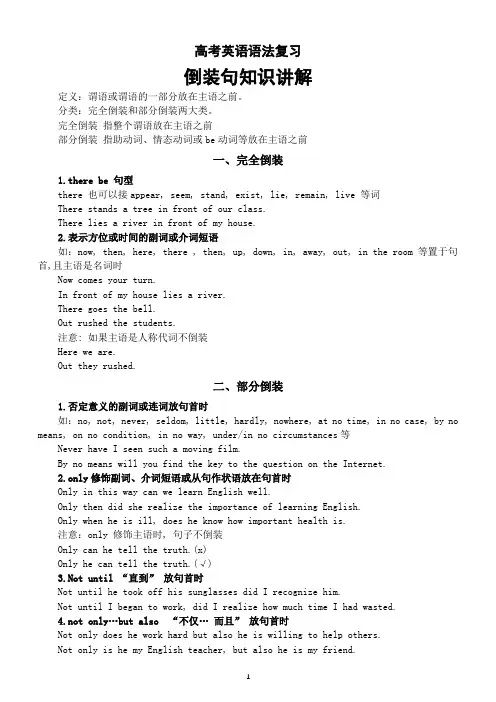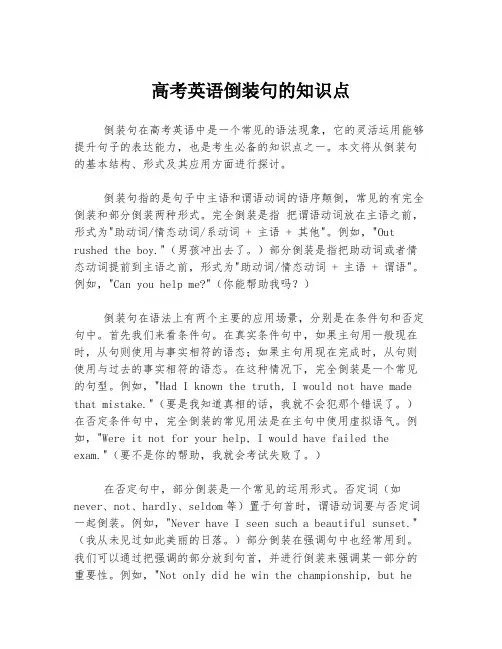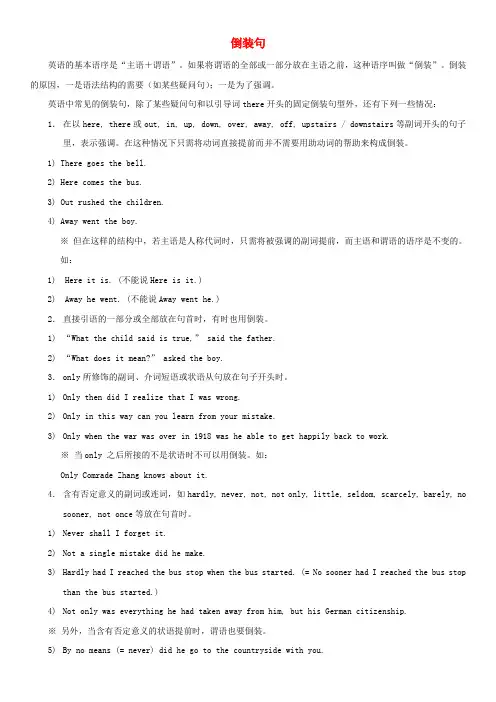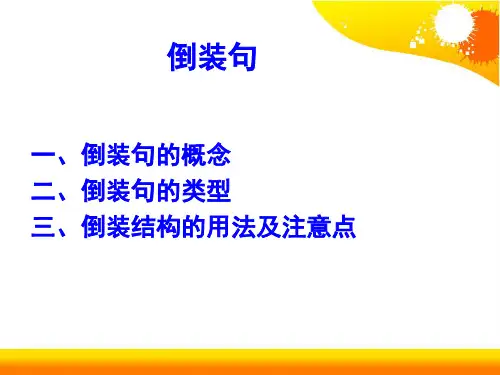人大附中高中英语新高考语法一轮复习讲义(25)倒装句的种类及用法知识点总结整理
高中英语倒装句规则归纳以及总结.ppt

9. Hardly, rarely, never, scarcely, little, seldom, at no time, in no way, on no account, nowhere
Never have I seen a moving film before. Little can I speak English. Hardly can I believe that.
2.在as和though引导的让步状语从句 中
As he was a man, he behaved like a woman.
Man as he was, he behaved like a woman. Though he did fail, he would never give up. Fail though he did, he would never give up.
备注:Not only you but also I am fond of music.
8. So, nor, neither表示“也”
They love having lots of friends, so do those with disabilities.
Lily can’t ride, neither/ nor can Lucy.
D. If he gave up
2.So funny ______that everyone burst into laughing.
A. she looked
B. was she looking
C. did she look
D. had she looked
3.Not once in these years ____ the prices of these products.
高中英语2025届高考语法复习倒装句知识讲解

高考英语语法复习倒装句知识讲解定义:谓语或谓语的一部分放在主语之前。
分类:完全倒装和部分倒装两大类。
完全倒装指整个谓语放在主语之前部分倒装指助动词、情态动词或be动词等放在主语之前一、完全倒装1.there be 句型there 也可以接appear, seem, stand, exist, lie, remain, live 等词There stands a tree in front of our class.There lies a river in front of my house.2.表示方位或时间的副词或介词短语如:now, then, here, there , then, up, down, in, away, out, in the room 等置于句首,且主语是名词时Now comes your turn.In front of my house lies a river.There goes the bell.Out rushed the students.注意: 如果主语是人称代词不倒装Here we are.Out they rushed.二、部分倒装1.否定意义的副词或连词放句首时如:no, not, never, seldom, little, hardly, nowhere, at no time, in no case, by no means, on no condition, in no way, under/in no circumstances等Never have I seen such a moving film.By no means will you find the key to the question on the Internet.2.only修饰副词、介词短语或从句作状语放在句首时Only in this way can we learn English well.Only then did she realize the importance of learning English.Only when he is ill, does he know how important health is.注意:only 修饰主语时, 句子不倒装Only can he tell the truth.(x)Only he can tell the truth.(√)3.Not until “直到”放句首时Not until he took off his sunglasses did I recognize him.Not until I began to work, did I realize how much time I had wasted.4.not only…but also “不仅…而且”放句首时Not only does he work hard but also he is willing to help others.Not only is he my English teacher, but also he is my friend.5.neither..., nor...“…不…, …也不…”Neither do I know it, nor do I care about it.6.no sooner...than, hardly/scarcely...when “一...就”Hardly had he arrived when the train left.No sooner had she gone than the traffic accident happened.7.“so+adj./adv.+ that...和“such+(a/an+) adj.+n.+ that...句型中, “so或such”放句首时So excited was he that he could not say a word.Such a good job has he done that we all admire him.8.“so + be 动词/ 助动词/ 情态动词 + 主语”用于对前面所说的肯定内容也适用于后者,表示“也”He is kind and helpful, so is she.I like English, so does he.They can speak English well, so can she.区分:He is kind and helpful, so he is.(不倒装表示“确实”)I like English, so I do.They can speak English well, so they can.9."neither/nor + be 动词/ 助动词/ 情态动词 + 主语”用于对前面所说的否定内容也适用于后者,表示“也不”He isn’t kind and helpful, neither/nor is she.I don’t like English, neither/nor does he.I can’t speak English well, neither/nor can she.注意:如果前面所说的内容既有肯定又有否定,或前后的谓语动词形式不一致时,则用结构“It is the same with +主语”或“So it is with +主语”I worked hard, but didn't pass the exam.So it was with my friend Lucy.10.as/though引导的让步状语从句结构 n./ adj./ v./ adv.+ as / though + 主语 + 谓语Child as he is, he knows a lot.(child 前不加冠词)Young as he is, he knows a lot.Try as he might, he failed.Much as I like Beijing, I can’t live there.11.频率的副词(often, many a time 等)放句首时Many a time has he made the same mistake.Often does he make the same mistake.12.虚拟语气if 引导的条件状语从句Were I you, I would work harder.Had you followed my advice, you would have passed the exam.Should it rain tomorrow, I would stay at home.13.某些表示祝愿的句子May you be happy!May your future become prosperous.。
高考英语倒装句的知识点

高考英语倒装句的知识点倒装句在高考英语中是一个常见的语法现象,它的灵活运用能够提升句子的表达能力,也是考生必备的知识点之一。
本文将从倒装句的基本结构、形式及其应用方面进行探讨。
倒装句指的是句子中主语和谓语动词的语序颠倒,常见的有完全倒装和部分倒装两种形式。
完全倒装是指把谓语动词放在主语之前,形式为"助动词/情态动词/系动词 + 主语 + 其他"。
例如,"Out rushed the boy."(男孩冲出去了。
)部分倒装是指把助动词或者情态动词提前到主语之前,形式为"助动词/情态动词 + 主语 + 谓语"。
例如,"Can you help me?"(你能帮助我吗?)倒装句在语法上有两个主要的应用场景,分别是在条件句和否定句中。
首先我们来看条件句。
在真实条件句中,如果主句用一般现在时,从句则使用与事实相符的语态;如果主句用现在完成时,从句则使用与过去的事实相符的语态。
在这种情况下,完全倒装是一个常见的句型。
例如,"Had I known the truth, I would not have made that mistake."(要是我知道真相的话,我就不会犯那个错误了。
)在否定条件句中,完全倒装的常见用法是在主句中使用虚拟语气。
例如,"Were it not for your help, I would have failed the exam."(要不是你的帮助,我就会考试失败了。
)在否定句中,部分倒装是一个常见的运用形式。
否定词(如never、not、hardly、seldom等)置于句首时,谓语动词要与否定词一起倒装。
例如,"Never have I seen such a beautiful sunset."(我从未见过如此美丽的日落。
)部分倒装在强调句中也经常用到。
高考英语一轮复习 语法点专题讲解 倒装句

倒装句英语的基本语序是“主语+谓语”。
如果将谓语的全部或一部分放在主语之前,这种语序叫做“倒装”。
倒装的原因,一是语法结构的需要(如某些疑问句);一是为了强调。
英语中常见的倒装句,除了某些疑问句和以引导词there开头的固定倒装句型外,还有下列一些情况:1.在以here, there或out, in, up, down, over, away, off, upstairs / downstairs等副词开头的句子里,表示强调。
在这种情况下只需将动词直接提前而并不需要用助动词的帮助来构成倒装。
1)There goes the bell.2)Here comes the bus.3)Out rushed the children.4)Away went the boy.※ 但在这样的结构中,若主语是人称代词时,只需将被强调的副词提前,而主语和谓语的语序是不变的。
如:1) Here it is. (不能说Here is it.)2) Away he went. (不能说Away went he.)2.直接引语的一部分或全部放在句首时,有时也用倒装。
1)“What the child said is true,” said th e father.2)“What does it mean?” asked the boy.3.only所修饰的副词、介词短语或状语从句放在句子开头时。
1)Only then did I realize that I was wrong.2)Only in this way can you learn from your mistake.3)Only when the war was over in 1918 was he able to get happily back to work.※ 当only 之后所接的不是状语时不可以用倒装。
如:Only Comrade Zhang knows about it.4.含有否定意义的副词或连词,如hardly, never, not, not only, little, seldom, scarcely, barely, no sooner, not once等放在句首时。
高考英语一轮语法复习特殊句式-倒装句课件

1. only修饰的状语放在句首时。
Only then did I realize my fault. Only in this way can we solve the problem. Only if you work hard will you succeed. 注意:当only修饰主语放句首时,不倒装。
高考英语一轮语法复习特殊句式-倒装 句课件 (共13 张)免 费课件 下载免 费课件 优秀pp t公开 课ppt免 费课件 下载免 费课件 优秀p pt公开 课ppt
3.表语位于句首时,其倒装结构为“表语+连系动词+主语”。
Present at the meeting were some scientists from America. 许多来自美国的科学家出席了会议。 Gone are the days when we were poor. 我们贫穷的日子一去不复返了。
上述情况中,若主语是人称代词,则主谓语不用倒装。
高考英语一轮语法复习特殊句式-倒装 句课件 (共13 张)免 费课件 下载免 费课件 优秀pp t公开 课ppt免 费课件 下载免 费课件 优秀p pt公开 课ppt
高考英语一轮语法复习特殊句式-倒装 句课件 (共13 张)免 费课件 下载免 费课件 优秀pp t公开 课ppt免 费课件 下载免 费课件 优秀p pt公开 课ppt
高考英语一轮语法复习特殊句式-倒装 句课件 (共13 张)免 费课件 下载免 费课件 优秀pp t公开 课ppt免 费课件 下载免 费课件 优秀p pt公开 课ppt
基本语序
主语 + 谓语
In came the teacher.
倒装语序
谓完语全+倒主装语 助动词/情态动词 +主部语分倒+ v装…
一轮复习倒装句课件

.单数可数名词作表语提前不用冠词
特殊句式3: Not until放在句首,从句不倒,主句倒。
1. Not until last week did they find the lost bike. (简单句) 2. Not until my son had entered the university did he realize the importance of time. (复合句) 3. Not until the early years of the 19th century did the man_know what heat is.
here, there, now, then, thus,out,away, up, 副词 置于句首, 谓语动词常用be, come, go, lie, run 等
不及物动时————完全倒装
观察:
1. There is a nice palace at the foot of the hill. 3. There stands a nice palace at the foot of the hill. 4. There lies a tall building between the two rows of trees. 5. There lived an old man in the town. 6. There seemed to be different opinions on this question.
小结1:表示地点的介词短语 放在句首时,谓语动 词为不及物动词———完全倒装。
观察: In came Mr. White. Up went the arrow into the air.
高考英语一轮语法复习特殊句式-倒装句PPT课件(原文)
4 so,neither/nor置于句首,表示前面所说 的情况也适用于另一个者时,要用部分倒装,
so, neither/nor+be/助动词/情态动词+主语
Lee can swim. So can I. He can’t swim. Neither\Nor can I. She likes fish. So does her sister. She didn’t know the truth. Neither/ Nor did her sister. She doesn’t know the secret. Nor does she care.
Trhyoausghhehmeigmhitg, htetdryid,nh’tepdaisdsnt'ht epaesxasm tHhaerdexaasmI s.tudied, I could not catch up
with them.
Old as they were, they stuck on working
5 so ...that ...和such ...that ...句式中,如果so或such和强 调的部分位于句首时,主句中的主语和谓语需要部分倒装。
e.g. So slowly did he walk that he didn’t catch the bus. So sudden was the attack that the enemy had no time to escape. Such great progress did he make that he was praised. Such a good teacher is he that we all love him.
高考英语一轮复习语法倒装句讲义
倒装句一、语法讲解G,(1)倒装句的类型心1.完全倒装:整个谓语移至主语前面叫完全倒装区Then came Mary and George.Have you any books on that subject?2.局部倒装:只把助动词,系动词或情态动词放在主语之前叫局部倒装Has he gone to school?Is he your classmate?Can you finish the work in three days?(2)倒装句的用法1.由于语法结构的需要而使用的倒装句曲1)用在疑问句中Do you have a physiology class on Tuesday afternoon?Why are you so angry with him?2)河在“Therebe ”结构中There are different forms of energy.There stands a high building by the river.3)用在以here , there , now , then等副词开头的句子中,here and there强调地点,用来引起人们的注意除then开头的句子用过去时以外,其余均用一般现在时.但是如果主语是代词就不倒装.Here is a letter for you. There comes the bus. Now comes my turn.Here you are. There he comes!4)用在省略了if的虚拟条件句中(把were, had或should移至主语前)Were I (If I were) in your place, I wouldn' t give it up so early.Had I (If I had ) know. I might have joined you in (he discussion.Should you (If you should) be interested, I have a book on the subject you misht like to see.5)用於一些装示祝愿的句子中Long live the friendship among the Asian peoples and sportsmen!Long live the king!6)直接引语的全部或一局部放在句首时,引述动词和他的主语有时倒装“ You have made great progress this term.M Said our teacher.“ Mr Crossett,v said my father. " will you permit an old pupil to shake hands with you? ” 引述动词的主语是代词,或谓语较广,或引述动词后还带间接宾语时,一般不用倒装句“What is your opinion? n I said.“ My father is a labour hero.n Xiao Wang told me.“ Why did you join the Red Amiy? ” Chairman Mao asked me like a school teacher questioning a pupil.7)用在以so开头,表示谓语所述情况也适用于另一个人或另一事物的肯定句,表示”也一样” .也这样”.其句形为“ So + be, have ,情态动词或助动词+主语”He saw it, and so did I.They can swim now, so can we.注:如果后面的句子只是重复前一句话的意思而不表示另一个主体,不用倒装句1( was hot yesterday. So it was.8)用在以neither, nor, no more开头的句子中,表示”…也不这样"其句形为"neither, nor no more + be , have ,情态动词或助动词+主语”The first one wasn' t good and neither was the second.He doesn' t care much for sweets. No more do I.2.为了加强语气而使用的倒装宙1)用在以never, hardly, scarcely, not only, nor , seldom, little, rarely, nowhere, by no means, not until, hardly (scarcely)…when, no sooner—than 等表示否认意义或半否认意义的副词或其组开头中的处子中.Never before have I met him.Hardly did I think it possible.Not only should we not be afraid of difficulties, but we should try our best to overcome them.Not until midnight did it stop raining.By no means will this method be satisfactory.No sooner had they got to the plant than they started to work.2)用在做频度状语often, always, once, many a time, now and again, every other day, every two hours等,方式状语thus及程度状语so等;地点状语in the distance, in front of 等的•几种副词或介词短语开头的句子中,常用倒装.Often had I intended to speak of it.Many a time has he helped me with my experiment.So busy is he that he had no time to spare.如果不是特别强调可以不倒装3)为了使句子更为生动,流畅,可把in, out , down, up, back, over, away, off之类的用做状语的副词放在句首,采用完全倒装.句中的谓语动词多为行为动词,不及物.In came the teacher and the lesson began.Off went the horses.Down came the hammer and out flew the sparks.主语是人称代词时,一般只将副词放在句首,主语和谓语位置不变.In he came and the lesson began.4)在副词0111y和它所修相的状语一起放在句首时,用倒装语序.句形为“Only +状语+ 局部倒装”Only when (he war was over in 1918 was he able to get happily back to work.Only in this way can wc learn maths well.不放在句首不倒装,不是状语是主语不倒装.Only the teachers are allowed to use this room.The aim was achieved only after a bitter struggle.5)用在强调表语的句子中表语提前,不是为了强调,而是使句子平衡,防止头重脚轻.Such was Albert Einstein, a simple man of great achievements.Great has been our achievements since liberation.如果主语是代词,而代词又无较长的修饰语修饰时,那么仅把表语提前,系动词不提到主语前.Terribly hot it certainly was.A very reliable person he is .6)用在某些让步状语从句中在止式的文体中,附属连词as用「特殊词序可以表示although这种结构表示强烈的对照.Tired as he was, he went on working.Cold as it was, we went out.Child as she is , she knows a great deal.考点透析“倒装句”审稿:白雪雁责编:张敏寻找完全倒装标志,巧记完全倒装句型店所谓完全倒装句型是指当某一特定内容出现在句首时将谓语动词直接提前放在该特定内容后面而构成的倒装句型,这种倒装句型的构成常有以下标志:here, there, in, out, up, down, away等介词、副词放在句首时应使用完全倒装句型。
高考英语一轮复习语法知识点汇总倒装
一、概说及分类倒装是一种语法手段,用以表示必定句子构造的需要和重申某一句子成分的需要。
英语最基本的构造是主谓构造,倒装就是将这类比较固定的词序加以颠倒。
倒装有两种:完整倒装和部分倒装。
将主语和谓语完整颠倒过来,叫做完整倒装;只将助动词(包含神态动词)移至主语以前,叫做部分倒装。
如:How goes the time?Here comes a bus.Never have I seen the film.By no means can we betray others.二、语法倒装1、疑问句(包含一般疑问句)和特别疑问句要倒装。
Is she kind?Where are you?When will us start out?2、there be存在句也是倒装句。
There is a book on the table.There lived a famous poet.There are many ways to solve the problem.3、叹息句中的倒装How tall the tree is! (表语前置)What a nice skirt your mother has bought(.宾语前置)4、当句首为 here、there、now、then 等地址副词和时间副词,谓语动词为be、go、come 等时,句子要倒装。
如:Here is the pen you are looking for.There goes the doorbell.Now comes you turn.Then came his father.注意当主语为人称代词时,则不用倒装。
如:Here you are.There here comes.5、祝福句中的倒装,如:Long live peace!May you be happy!So be it!6、虚构条件从句中的谓语部分含有were、had 或 should 时,可把它们放到句首,省去连词if ,形成倒装句。
高考英语语法一轮复习——倒装句课件(共24张ppt)
2020/6/16
10
Rhetorical Inversion
• 1. only + adverbial part (状语) • Only by understanding its religious roots can republicanism
• 3. grammatical inversion in subjunctive mood • Had they been given more help, they would have succeeded. • Were it fine tomorrow, we would go on a picnic. • __C__ you ____ further problems with your printer, contact
主语是人称代词时,不用倒装
There he comes.
2020/6/16
8
Grammatical Inversion
5. so, nor, neither开头的句子 I went to a movie last night. So did my sister and brother.
• Tom doesn’t like bananas. Neither does his wife.
your dealer for advice. • A. If, had B. Have, had • C. Should, have D. In case, had ( TEM 2005)
2020/6/16
7
Grammatical Inversion
4. here, there, now, then等引导的句子中,谓语是be, come, go 等 Here is the letter you have been looking forward to. There goes the bell! 打铃了。 Now comes your turn. 现在轮到你了。
- 1、下载文档前请自行甄别文档内容的完整性,平台不提供额外的编辑、内容补充、找答案等附加服务。
- 2、"仅部分预览"的文档,不可在线预览部分如存在完整性等问题,可反馈申请退款(可完整预览的文档不适用该条件!)。
- 3、如文档侵犯您的权益,请联系客服反馈,我们会尽快为您处理(人工客服工作时间:9:00-18:30)。
2021届人大附中高中英语新高考语法一轮复习讲义(25)倒装句的种类及用法知识点总结整理
英语最基本的语序是主语在前,谓语动词在后。
但有时由
于句子结构的需要或表示强调,就要采用倒装形式。
倒装句分
为完全倒装和部分倒装。
将谓语动词完全移到主语之前称为完
全倒装,只将助动词或情态动词移到主语之前称为部分倒装。
完全倒装常见结构及用法
全部倒装是指将句子中的谓语动词全部置于主语之前。
此
结构通常只用于一般现在时和一般过去时。
常见的结构有:
1. 以地点副词(here,there)、时间副词(now,then)
开头的句子,主语是普通名词,用全部倒装。
例:
There comes the bus!(公交车来了)
Then came the chairman.(之后主席来了)
注意:如果句子的主语是代词时,则不倒装。
Here we are.(我们到了)
Here you are (给你)
2. 表方位的地点副词(介副词)如out、in、up、down、away、off等,为了使句子更生动,常将这些副词提前到句首,
这时用全部倒装。
例1:In walked a boy.(一个男孩走了进来)
例2:Off dashed the car.(汽车飞驰而去)
注意:句子的主语是代词时,则不倒装。
例:In he walked.(他走了进来)
3. 地点副词短语(如:in the room、at the station、by the window)等放在句首进行强调时,使用全部倒装。
例:From the window came the sound of music.(窗外传来悠扬的音乐)
注:若主语为代词,不宜使用倒装
He stood in the front of the house .(佳)
In front of the house he stood(劣)
他站在家门口
4. 表语类。
当句子主语部分较长为了保持句子平衡,或为了强调表语部分, 将作表语的形容词、分词、介词短语置于句首时,需完全倒装。
句子的结构为“表语+系动词+主语”。
例1:Gone are the days when we had nothing to eat.(没有东西吃的日子已经过去了)
例2:Inside the parcel was a letter.(包裹里有一封信)
部分倒装的结构及用法
只将助动词或情态动词移到主语之前称为部分倒装。
若没有助动词或情态动词,则需根据时态及人称在主语之前置助动词do、does或did,再将动词变为原型动词。
适合部分倒装的结构:
1. 以had/were/should 开头省略 if 的虚拟条件句,从句需用部分倒装。
例:Were I you, I would go there.
2. 具有否定意义的副词、否定副词短语置于句首时,用部分倒装。
否定副词或否定副词短语置于句首要部分倒装
否定副词:
never, hardly, scarcely, rarely, seldom, little
否定副词短语:
By no means, in no way, on no account, only +介词短语,
only... then,not only... but also, only when, not until, no
sooner... than等
例1:Never is he happy(他从不快乐)
例2:By no means is he the person we need(他绝对不是我们需要的人)
例3:Not only does he do well in his lessons, but also he often helps others with their lessons.
3. “only+状语”位于句首时, 用部分倒装。
例1:Only then did I know the importance of English.(那时我才知道英语的重要性)
例2:Only by setting goals can you succeed.(只有制定目标你才能成功)
4. so/such...that结构中,有时要强调so/such所修饰的形容词或副词,常将so 连同它所修饰的形容词或副词一起提前放在句首。
例1:So bright was the moon that the flowers seem as bright as by day.
例2:Such a wonderful job did he do that he won our respect.(他表现得如此棒,因而赢得我们的信任)
5.neither/nor+ be 动词/助动词/情态动词+ 主语的结构中,译为“……也不这样”
例: Mary isn't good at swimming. Neither/nor am I.(Mary不擅长游泳,我也是)
6. so+be 动词/助动词/情态动词+主语”结构,意为“……也是如此”
She plays piano well,so do I.(她钢琴弹得很好,我也是)
特殊形式的倒装句
1. as引导的让步状语从句要倒装,有如下几种形式:
As引导让步状语从句的4种倒装结构:
从句谓语为“不及物动词+副词”,副词提前
例: Hard as you try, you will not succeed (尽管你很努力,你也不会成功)
从句谓语为“情态动词+不及物动词”,不及物动词提前
例: Wait as you may, he will not see you. (即使你等待,他也不会见你)
从句谓语为“系动词+形容词”形容词提前
例: Proud as they are, they are afraid to see me (尽管他们很高傲,还是怕看到我)
从句谓语为“系动词+单数名词”,名词提前
例: Child as he is, he seems to know everything (尽管是个孩子,他似乎知道很多事情)
2. whatever 或however 引导的让步状语从句
However busy you are, you should spend some time reading books weekly.(无论你多么忙,每周你都应该花点时间读书)
3. the more...the more...句型
The more English you practise, the better your English is. (你练得越多,你的英语就越好)。
